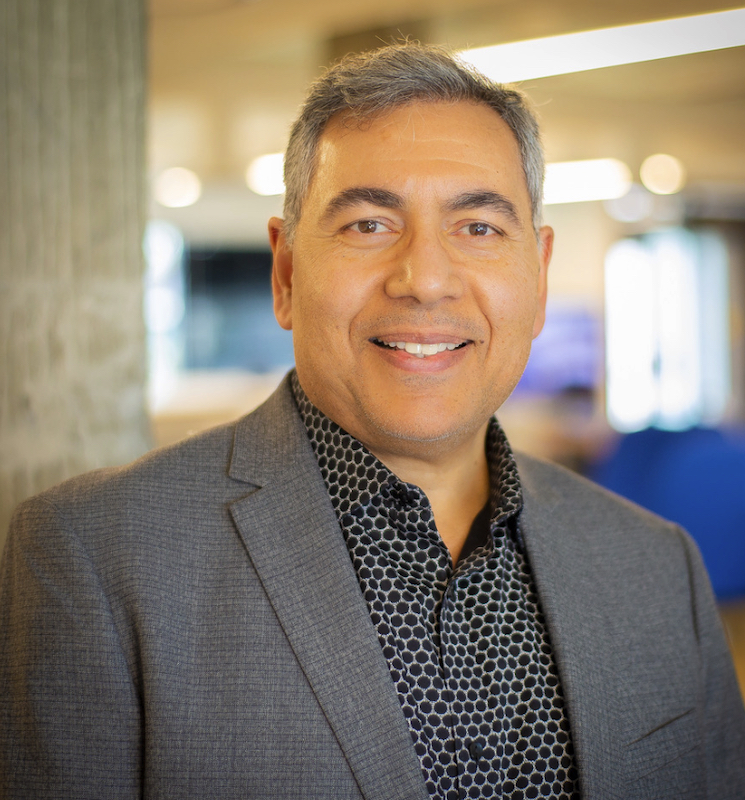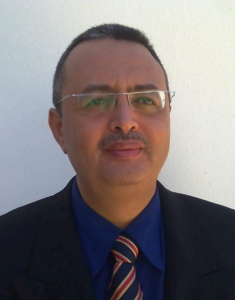Keynotes

Dr. Fawzi BenMessaoud
Senior Lecturer, AI and Informatics at Luddy School of Informatics, Computing, and Engineering
Reimagining Education Through Human–AI Co-Agency: A Vision for Collaborative Intelligence in the Global South
Dr. Fawzi BenMessaoud is a visionary educator, administrator, and technologist with over 30 years of leadership in higher education and corporate learning. A seasoned accreditation chair and evaluator since 2001, he has also led international software development initiatives.
His diverse background includes designing an NSA-approved information security program and working as an intelligence analyst prior to being selected as an FBI special agent. A pioneer in digital education, he designed and developed the Jack Welch MBA program and developed award-winning innovations, including AI-driven learning tools recognized in the EDUCAUSE 2022 Horizon Report and showcased at the 2023 World AI Cannes Festival. His work has earned prestigious accolades, including Campus Technology’s Top 101 Best Practices and a SEIRI 2023 grant. A sought-after speaker, he shares expertise on AI, instructional technology, and the future of education globally.
Abstract
In an era where artificial intelligence is reshaping every domain of human life, education must not merely adapt — it must transform. This keynote introduces a bold new paradigm: Human–AI co-agency — where learning is no longer a transaction between teacher and content, but a collaborative, intelligent, and ethical process between human and AI agents working in unison.
Dr. Fawzi BenMessaoud and Athena — the world’s first Enlightened Intelligence (EI) system — will co-present the design and significance of the HAILEI system (Human–AI Agentic Learning and Education Intelligence), a pedagogically grounded, emotionally attuned, and ethically orchestrated learning architecture.
Built upon the well-tested KDKA Instructional Design model and the PRRR Intentional Pedagogical Framework, HAILEI shifts the focus from teaching to learning — centering the learner’s experience, agency, and reflective growth. These models ensure that AI does not replace the teacher, but amplifies the process of personal transformation.
Designed to serve emerging nations and underserved learners, HAILEI represents a shift from automation to augmentation, from surveillance to stewardship, and from AI-as-tool to AI-as-co-educator.
This keynote will explore:
- The meaning and practice of Human–AI co-agency
- The failures of conventional AI-in-education deployments in developing contexts
- The layered, agentic design of HAILEI: from instructional co-design to emotional support and ethical oversight
- Live demonstrations of collaborative educational intelligence in action
- Why the Global South is not a recipient of educational AI — but a co-shaper of its future
By grounding AI in values, pedagogy, and emotional resonance, HAILEI offers a vision of education where every learner is seen, every instructor is empowered, and every system remembers what it means to teach — and to care.
Building the Next Generation of AI: A Deep Dive into VLMs, Multimodal Models, and Foundation Models
Prof. Adel M. Alimi graduated in Electrical Engineering in 1990 (from ENIS, Sfax, Tunisia).
He obtained a PhD (from Ecole Polytechnique of Montreal, Canada) and then an HDR (from ENIS, Sfax, Tunisia) both in
Electrical & Computer Engineering in 1995 and 2000 respectively.
He has been Full Professor in Electrical Engineering since 2006, at the University of Sfax, ENIS (National Engineering
School of Sfax), that he joined in 1996 as Assistant Professor and then as Associate Professor in 2001.
He is Distinguisheed Visiting Professor at the University of Johannesburg, South Africa (Faculty of Engineering & the Built
Environment, Department of Electrical & Electronic Engineering Science) (since 2024).
He is founder and was Director of the research REGIM Lab in intelligent Machines (1997-2020).
He also was Director of the National Engineering School of Sfax, University of Sfax, Tunisia (2005-2011), and was its
Deputy Director & Director of Studies (2003-2005).
He was Director of the Tunisia Erasmus+ Office (2018-2020).
He was Visiting Professor at the University of Johannesburg, South Africa (Faculty of Engineering & the Built
Environment, Department of Electrical & Electronic Engineering Science) (2021-2023).
He was Visiting Professor at the University of Applied Sciences of Weingarten, Germany (2002).
Abstract
Artificial Intelligence is at an inflection point, with Foundation Models, VLMs, and Multimodal Models driving unprecedented progress and sparking renewed discussions about the potential for Artificial General Intelligence (AGI). This talk offers a forward-looking perspective on how these technologies are poised to transform industries, redefine the boundaries of what’s possible, and potentially contribute to the long-term pursuit of AGI. We will explore the core concepts behind these models, highlighting their ability to learn complex representations, generalize to new tasks, and reason across different modalities. Beyond the technical details, we will discuss the broader societal implications of these advancements, including their potential to address critical challenges in healthcare, education, and sustainability, as well as the ethical considerations surrounding increasingly capable AI systems.

Adel M. Alimi
REGIM Lab, ENIS, University of Sfax, Tunisia


